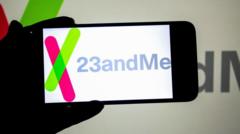Is 23andMe's Data Breach a Warning for Your Privacy?

Understanding the 23andMe Data Breach: Implications and Lessons Learned
In October 2023, 23andMe, a prominent DNA testing firm, found itself in the spotlight for all the wrong reasons. The company's inability to protect sensitive user data led to a significant data breach that exposed the personal information of nearly 7 million individuals. As a result, the UK Information Commissioner’s Office (ICO) imposed a hefty fine of £2.31 million on the company, underscoring the importance of data protection, especially in the realm of genetic information. This article delves into the specifics of the breach, the subsequent penalties, and the crucial lessons that can be gleaned from this incident.
The Breach: What Happened?
The breach, classified as a "credential stuffing" attack, occurred when hackers exploited previously leaked passwords to gain unauthorized access to 23andMe accounts. Credential stuffing relies on the fact that many users reuse passwords across multiple platforms, making them vulnerable to such attacks. In this incident, hackers managed to access approximately 14,000 individual accounts, ultimately downloading information related to about 6.9 million users connected to those accounts.
Key Details of the Breach
The ICO's investigation revealed several alarming details regarding the breach:
- Exposed Information: The data accessed included names, year of birth, geographic information, profile images, race, ethnicity, health reports, and family trees. However, it is critical to note that DNA records themselves were not compromised.
- UK Residents Affected: A total of 155,592 individuals in the UK had their personal data accessed during the breach.
- Delayed Response: The ICO criticized 23andMe for its slow response in addressing the vulnerabilities that led to the breach, highlighting a lack of urgency in implementing necessary security measures.
Legal and Financial Ramifications
The ICO's fine of £2.31 million reflects the severity of the breach and the company's failure to adhere to UK data protection laws. The ICO's Information Commissioner, John Edwards, emphasized the damaging nature of the breach, stating that sensitive personal information was laid bare, and once exposed, such information cannot be easily altered or retracted.
Under UK data protection law, genetic data is classified as special category data, necessitating enhanced protection measures. The ICO's findings indicated that 23andMe fell short in the following areas:
Inadequate Security Measures
23andMe did not implement adequate authentication and verification processes for user logins. Specifically:
- Lack of Multi-Factor Authentication: The absence of mandatory multi-factor authentication left user accounts vulnerable to unauthorized access.
- Weak Password Requirements: The company's password policies were insufficient, allowing users to set weak passwords that could be easily compromised.
- Inadequate Verification for Data Downloads: Users attempting to download raw genetic data faced minimal verification hurdles, further increasing risk.
23andMe's Response and Future Plans
In light of the breach, 23andMe has undergone a significant transformation. Following the investigation, the company filed for bankruptcy and is now in the process of being sold to TTAM Research Institute, led by co-founder Anne Wojcicki. The new ownership comes with commitments to enhance data protection and privacy for customers, addressing the concerns raised by the ICO and the Office of the Privacy Commissioner of Canada (OPC).
Commitments to Data Protection
As part of the sale agreement, TTAM Research Institute has pledged to:
- Uphold existing policies and consumer protections.
- Allow customers to delete their accounts and genetic data, as well as opt out of research initiatives.
These commitments are critical not only for restoring consumer trust but also for ensuring compliance with data protection laws moving forward.
Lessons Learned from the 23andMe Data Breach
The 23andMe incident serves as a stark reminder of the vulnerabilities that can exist even within well-known companies. Here are some key takeaways for individuals and organizations alike:
1. Importance of Strong Authentication Practices
Implementing robust authentication practices, including multi-factor authentication, is essential for safeguarding sensitive user information. By requiring additional verification methods, companies can significantly reduce the risk of unauthorized access.
2. Regular Security Audits
Organizations should conduct regular security assessments to identify vulnerabilities and ensure compliance with data protection regulations. Proactive measures can prevent breaches before they occur.
3. User Education on Password Management
Educating users on the importance of creating strong, unique passwords can mitigate risks associated with credential stuffing attacks. Encouraging the use of password managers can also assist users in maintaining secure login practices.
4. Transparency in Data Protection Practices
Companies must be transparent about their data protection measures and quickly communicate with affected users in the event of a breach. Transparency fosters trust and helps users understand their rights regarding their personal information.
5. Legal Compliance and Accountability
Businesses must remain vigilant in adhering to data protection laws, particularly when handling sensitive information such as genetic data. Non-compliance can result in severe financial penalties and damage to reputation.
FAQs
What is a credential stuffing attack?
A credential stuffing attack occurs when hackers use stolen usernames and passwords from previous breaches to gain unauthorized access to user accounts on different platforms, taking advantage of the tendency of users to reuse credentials.
What type of information was exposed in the 23andMe data breach?
The breach exposed personal data, including names, year of birth, geographic information, profile images, race, ethnicity, health reports, and family trees of nearly 7 million users. However, DNA records were not accessed.
What are the implications of the fine imposed by the ICO?
The £2.31 million fine signifies the ICO's commitment to enforcing data protection laws and holding companies accountable for failing to protect sensitive information. It serves as a warning to other organizations about the importance of robust data security practices.
How can individuals protect their personal data online?
Individuals can enhance their online security by using strong, unique passwords for each account, enabling multi-factor authentication, and being cautious about sharing personal information on social media and other platforms.
What should companies do after a data breach?
After a data breach, companies should promptly notify affected users, conduct a thorough investigation, strengthen security measures, and implement a transparent communication strategy to restore trust with their customers.
Final Thoughts
The 23andMe data breach serves as a critical lesson in the rapidly evolving landscape of data protection. With the increasing prevalence of cyber threats, organizations must prioritize the security of user data, especially when it pertains to highly sensitive information like genetic data. As individuals, we must remain vigilant about our online security and advocate for stronger protections for our personal information.
How can we collectively ensure better protection against data breaches in the future? The responsibility lies not just with companies but also with individuals and regulators to foster a culture of security and awareness.
#DataSecurity #CyberAwareness #GeneticPrivacy
Published: 2025-06-17 13:47:03 | Category: technology



